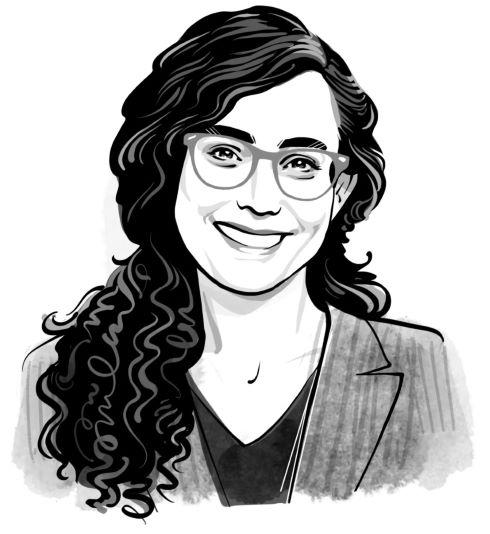October 2022: Handpicked
Each month, the Yiddish Book Center asks a member of our staff or a special friend to select favorite stories, books, interviews, or articles from our online collections. This month, we’re excited to share with you picks by Sonia Gollance.

Sonia Gollance is Lecturer in Yiddish (Assistant Professor) at University College London. Her research interests include Yiddish studies, German-Jewish literature, gender studies and performance studies. She has taught previously at the University of Vienna, The Ohio State University, and the University of Göttingen. Her book, It Could Lead to Dancing: Mixed-Sex Dancing and Jewish Modernity (Stanford University Press, 2021) was a National Jewish Book Award finalist. Her ongoing translation of Tea Arciszewska's play Miryeml was supported by a Translation Fellowship from the Yiddish Book Center. She is currently developing a project on women who wrote plays in Yiddish. In addition to her scholarship, she is also a Yiddish dance leader.
Shockingly, to my knowledge, no Yiddish play by a woman has been published in translation in its entirety (although fortunately that situation should change within the year). The Yiddish Book Center Translation Fellowship has played an important role in supporting translations of plays by women. I teach this excerpt from Chloë (Zisl) Piazza’s translation of Di agune (The Chained Wife) by Maria Lerner because it’s the first known play by a Yiddish woman writer––and currently the most accessible English-language example of Yiddish dramatic literature by a woman.
Paula Pryłucki’s one-act play Aktor (Actor) brilliantly satirizes the acting profession and sharply criticizes men who pursue the arts at the expense of their families’ practical needs: while an actor’s wife labors in childbirth offstage, her husband and two of his colleagues debate whether the child should follow the father’s career path.
Dos amolike yidishe Varshe (Jewish Warsaw That Was)
The impressive anthology Dos amolike yidishe Varshe (Jewish Warsaw That Was), edited by Melekh Ravitch, contains works by 139 Yiddish writers, including a scene from Tea Arciszewska’s modernist play Miryeml and an essay about her friendship with I. L. Peretz.
Shirley Zaft Benyas's Oral History
Although I literally grew up on Second Avenue in New York City, Michigan was the “Old Country” for me in childhood due to my grandparents’ Midwestern roots. In this Wexler Oral History interview, singer and Yiddish theater actress Shirley Zaft Benyas discusses the Sholem Aleichem Institute in West Bloomfield, MI, of which my relatives Dr. Peter G. Shifrin z”l (the person who suggested I learn Yiddish) and Esther Shifrin z”l were members.
Along with reporting on international labor issues, Gerekhtigkeit (Justice), the journal of the International Ladies’ Garment Workers Union, also included a theater column that reviewed productions such as Abraham Shomer’s comedy Aykele Mazek (Ikey the Scamp), in the April 15, 1921, issue. All four surviving children of the popular novelist and playwright Nokhem Meyer Shaykevitch (better known as Shomer)—Abraham Shomer, Rose Shomer Bachelis, Miriam Shomer Zunser, and Anna Shomer Rothenberg—wrote plays and were involved in American Jewish cultural organizations.
Di Froyen (The Women) on stage
Contemporary Yiddish-speaking communities have not generally been the focus of the Yiddish Book Center, and other than in narratives of rebellion like the Netflix miniseries Unorthodox, women’s experiences are not necessarily centered in materials that present Hasidic life. This interview on The Shmooze podcast, with Melissa Weisz, Malky Goldman, and Rachel Botchan talking about their Yiddish-language all-female one-act play Di Froyen (The Women), based on Naomi Ragen’s Women’s Minyan, reflects on contemporary Hasidic Yiddish and the women who speak it.
Q&A
Tell us about your selections and what they say about your relationship with Yiddish language and culture.
As someone who teaches in higher education (including Yiddish theater), I approached my selections as if I were writing a syllabus, focusing somewhat narrowly on women’s involvement in Yiddish theater, especially playwriting. For me, writing a syllabus is like gathering tools to solve a problem, which in this case meant finding materials about women playwrights when we’re just at the cusp of learning more about them. These selections helped me appreciate once more the sheer variety of resources on the Yiddish Book Center’s website and how materials that relate to women’s creativity on the Yiddish stage can open up a variety of perspectives on Yiddish cultural production more broadly. It was important to me to showcase materials that spotlight women in Yiddish theater not simply because of the Decade of Discovery theme or because I happen to be researching women who wrote plays in Yiddish, but also because there has been so little scholarship on or published English translations of women playwrights. It can be a real challenge to include these voices in a Yiddish literature or theater class, and I wanted to show how the Center’s resources could help educators confront this absence.
What are you working on next?
I first became interested in researching the contributions of women Yiddish playwrights through my work as Managing Editor of Plotting Yiddish Drama, the Digital Yiddish Theatre Project’s online database of English-language plot synopses of Yiddish plays. I’m currently translating Tea Arciszewska’s Miryeml (1958/59), a modernist play that deftly integrates twentieth-century history and Jewish folklore into a narrative about children’s response to trauma. Although the playwright herself is largely forgotten today, she was involved in Yiddish cultural production in the 1910s and 1920s and part of I. L. Peretz’s renowned literary circle (you can read about her bohemian life in Warsaw in my translation of an excerpt from Y. Y. Trunk’s memoirs in Pakn Treger, the Center’s English-language magazine). Miryeml is a unique literary response to the Holocaust that received a 1954 Alexander Shapiro Prize for best Yiddish drama from the Congress for Jewish Culture. This project was supported by the Yiddish Book Center Translation Fellowship. I’m also planning a book about women who wrote plays in Yiddish, focusing in particular on the dramatic works of the “Shvester Shomer” (Shomer Sisters), Rose Shomer Bachelis and Miriam Shomer Zunser.
